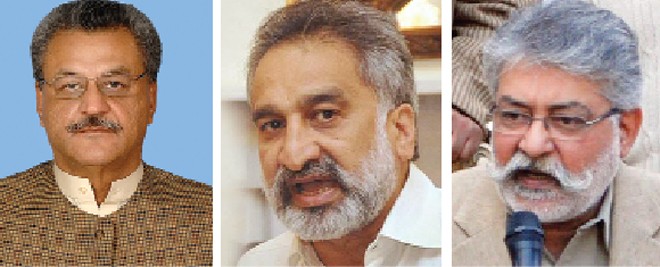
Will the coalition of 10 political and nationalist parties, formed to counter the PPP, impact the politics of Sindh?

Once again, opposition parliamentary parties, politicians and nationalist parties have formed a grand alliance against the Pakistan People’s Party in Sindh. Analysts believe that the recently formed alliance, similar to the one formed in the past, is unlikely to harm the ruling party in the province.
On January 9, Sindh’s opposition parties and nationalist groups agreed to form a grand alliance. Pir Pagara, head of the Pakistan Muslim League-Functional (PML-F) was chosen as the head of the alliance, which includes the PML-F, Syed Jalal Mehmood Shah-led Sindh United Party and Ayaz Latif Palijo-led Qaumi Awami Tehreek, alongside four former chief ministers Arbab Ghulam Rahim, Liaquat Jatoi, Mumtaz Bhutto and Syed Ghous Ali Shah. The PPP’s disgruntled leader and former home minister Zulfiqar Mirza, Ghulam Murtaza Jatoi, head of defunct National People’s Party which merged in the PML-N after the 2013 general polls and Abdullah Hussain Haroon, former Pakistan ambassador to the United Nation, are also part of the alliance.
Besides, a 16-member committee comprising representatives of the opposition parties to decide the future course of action and propose a name for the alliance was also formed.
Mumtaz Bhutto, one of the alliance’s key leaders, says the formation of the alliance is the need of the hour. "All component political parties agree that bad governance, corruption and worst security situation are rampant during the PPP’s rule," Bhutto tells TNS. "The alliance will save residents of Sindh from further suffering and stop the PPP from damaging the province."
Although four former chief ministers are part of the Pakistan Muslim League-Nawaz, the party officially has not joined the alliance. Its secretary general senator Nehal Hashmi attended the alliance’s meeting as an observer. Similarly, leaders of the Pakistan Tehreek-e-Insaf (PTI) attended the meetings as an observer but did not join the alliance.
Interestingly, the Muttahida Qaumi Movement (MQM) -- the second largest party in Sindh -- was not invited, at any stage, to join the alliance. Interviews with alliance’s leaders suggest that former chief ministers were in favour of inviting the MQM to join the alliance but because of severe opposition by Mirza and Palijo, the alliance leaders neither invited the MQM nor consulted its leaders regarding the formation of the alliance.
Dr Qadir Magsi-led Sindh Taraqqi-Pasand Party (STP), another key Sindhi nationalist party, and the Jamiat-e-Ulema-e-Islam-Fazl (JUI-F), which has also emerged as a key political party in recent local government polls in northern Sindh, kept distance from the alliance.
Political analysts believe that the recently formed alliance will not have any impact on the province’s politics and is not able to give tough time to the PPP. But some of them are suspicious of the alliance’s real agenda and timing.
Except for Sanghar, the PPP has badly defeated the component parties of the alliance in the recent local government polls in the rural parts of the province. Most of the component parties had forged anti-PPP alliances in different districts, especially Larkana, but could not give a tough fight to the PPP.
Qadir Lashari, a Karachi-based veteran journalist who studies Sindh politics extensively, is of the view that Sindh’s traditional politicians make anti-PPP alliances from time to time but could not harm the PPP in the province. "There is a perception among Sindhis that such alliances have been formed at the behest of the establishment which end up generating more support for the PPP, despite its bad governance and allegation of corruption," Lashari tells TNS.
Some experts think that forging such alliances is not the proper way to fill the vacuum of a strong political alternative force against the PPP. "All these politicians are infamous for changing their loyalties. They want to come to power by forging alliances or with the support of the establishment," comments a tv anchor at a Sindhi channel in Hyderabad.
"Why did they [component parties of the alliance] not form an alliance before the local government polls? he questions.
One wonders, if it has something to do with the recent tussle between the PPP and the centre over the issue of Rangers’ policing powers.
Political commentators say that Pagara led a campaign against the controversial local government ordinance in 2012 and it mustered support from Sindh’s civil society and political forces that led to a grand alliance. However, they say, the campaign fell by the wayside and Pagara couldn’t maintain his contacts with the leaders of the alliance.
Earlier, ahead of the 2013 general polls, a 10-party electoral alliance was formed against the PPP. With most of its members in its recently formed alliance, the Jamaat-e-Islami, JUI-F, STP and PML-N were also part of that alliance. However, the 10-party alliance could not damage the PPP in the general polls.
The PPP leaders say such alliances could not hurt the party’s vote bank and popularity in the province. "Those who have formed the anti-PPP alliance are the same people who were rejected by the people in the recently held local government polls and the 2013 general polls," says Nisar Khuhro, senior PPP minister.
"This is not the first alliance of its kind against the PPP. Such alliances were formed in the past and all have been thrown in the dustbin of history," he said in a statement issued after the formation of the alliance.